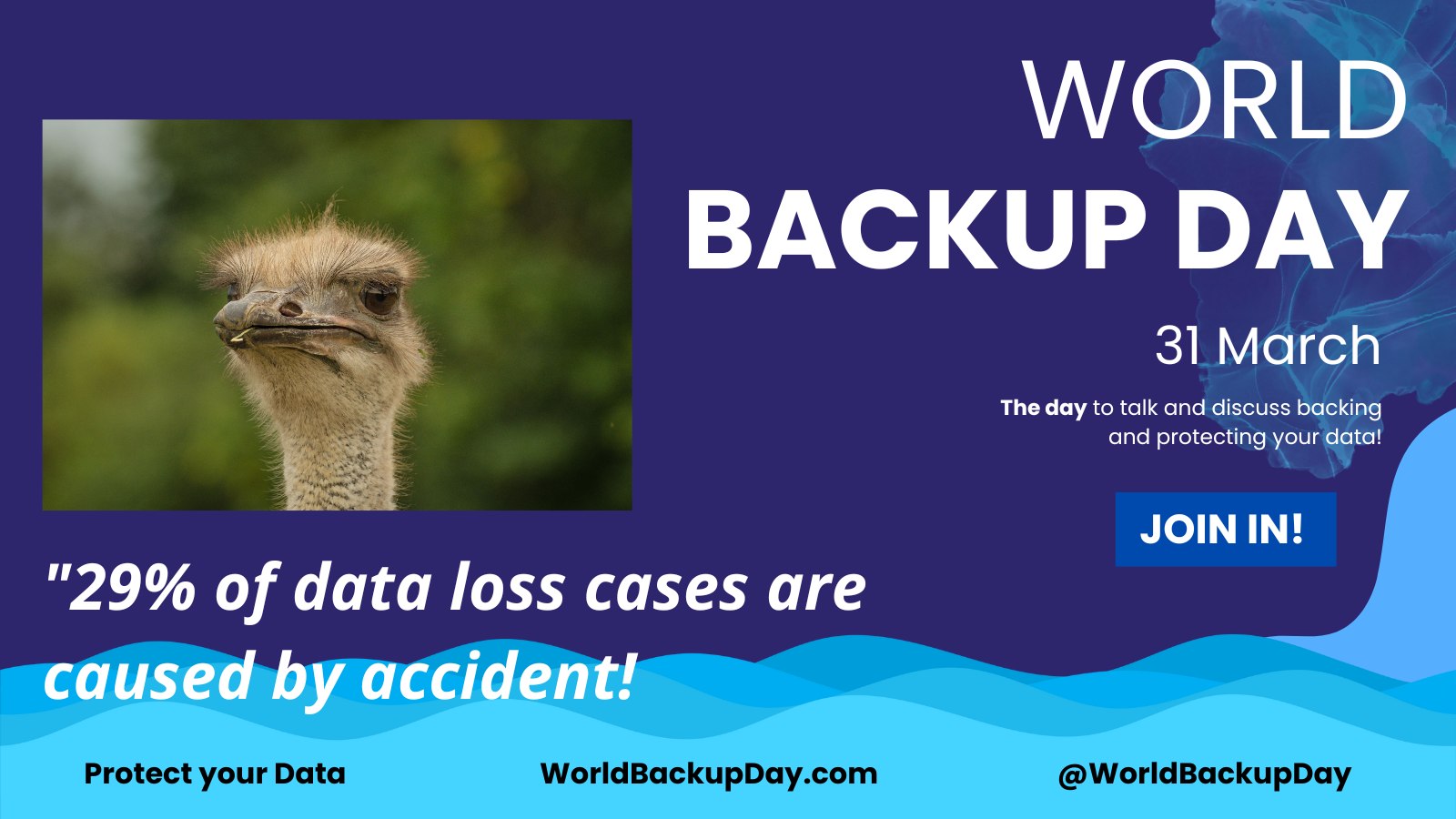World Backup Day is March 31st! Discover how GiaSpace helps Florida businesses secure their critical data with robust backup and disaster recovery strategies, preventing costly downtime and devastating data loss.

What is World Backup Day and Why Does it Matter for My Business?
March 31st isn’t just another day on the calendar; it’s World Backup Day, a global initiative dedicated to reminding individuals and, crucially, businesses, about the paramount importance of data backup. But why should this day resonate with your Florida business?
In today’s digital landscape, your business data isn’t just files and folders – it’s the lifeblood of your operations. From client records and financial ledgers to proprietary designs and communication histories, every piece of data holds immense value. World Backup Day serves as an annual wake-up call, urging you to proactively assess and strengthen your data protection strategies. It’s a dedicated moment to ensure your operations can withstand unexpected threats like hardware failures, cyberattacks (especially ransomware!), natural disasters, or even simple human error.
Ignoring this essential practice can lead to catastrophic consequences, far beyond just lost files. For Florida businesses, where hurricanes and other environmental risks are a constant concern, robust data backup isn’t just good practice—it’s a critical component of business continuity and resilience. Don’t wait for a crisis; World Backup Day is your prompt to get prepared.
The Critical Risks of Not Backing Up Your Business Data
Many businesses operate with a “it won’t happen to me” mindset when it comes to data loss. This is a dangerous gamble. The truth is, data loss isn’t a possibility; it’s a near certainty without proper precautions. The consequences of neglecting data backup are severe and can cripple even the most robust operations.
Consider these critical risks:
- Financial Ruin: Data loss directly translates to lost revenue from downtime, potential legal fees from compliance breaches, and the immense cost of attempting data recovery (if it’s even possible). For many small and medium businesses, a significant data loss event can lead to permanent closure.
- Operational Stoppage: Without access to essential data, your business grinds to a halt. Employees can’t work, customers can’t be served, and supply chains break down. Every minute of downtime costs money and erodes trust.
- Reputational Damage: A data breach or significant data loss event can shatter your customer’s trust and damage your brand’s reputation beyond repair. News of data incidents spreads quickly, leading to loss of current clients and difficulty attracting new ones.
- Compliance Violations & Legal Headaches: Industries like healthcare (HIPAA), finance, and many others have strict data retention and protection regulations. Failure to comply due to data loss can result in hefty fines, legal action, and lasting damage to your business’s standing.
- Loss of Competitive Edge: If your competitors remain operational while you’re struggling to recover data, you lose critical ground in the market. Innovation stops, and your ability to adapt to changing market conditions is severely hampered.
Don’t let your business become another statistic. Proactive data backup is the ultimate insurance policy against these devastating outcomes.
Understanding the 3-2-1-1-0 Backup Rule for Businesses
When it comes to crafting an unshakeable data protection strategy, industry experts often champion the “3-2-1-1-0 Rule.” This isn’t just a guideline; it’s a robust framework designed to provide multiple layers of protection against various threats, ensuring your business data is always recoverable.
Here’s how this critical rule breaks down for your business:
Cloud Backup vs. On-Premise Backup: Which is Right for My Business?
Deciding where to store your valuable business backups is a pivotal decision. Both cloud backup and on-premise solutions offer distinct advantages, and the best choice often depends on your specific needs, budget, and infrastructure.
- On-Premise Backup:
- What it is: Data is backed up to storage devices located physically within your business’s premises (e.g., external hard drives, network-attached storage (NAS) devices, local servers).
- Pros: Potentially faster recovery times for large datasets (if local hardware is robust), direct control over your data, and no ongoing subscription fees for storage (though hardware costs exist).
- Cons: Vulnerable to local disasters (fire, flood, theft), requires significant upfront investment in hardware, ongoing maintenance and monitoring by your team, and limited scalability. It also does not fulfill the “offsite” or “offline” requirements of the 3-2-1-1-0 rule on its own.
- Cloud Backup:
- What it is: Data is encrypted and transmitted over the internet to secure, remote data centers managed by a third-party provider (e.g., GiaSpace’s cloud solutions, Microsoft Azure, AWS).
- Pros: Excellent for offsite storage, high scalability (pay-as-you-go), automatic updates and maintenance handled by the provider, robust security features in professional data centers, and protection against local disasters. It fulfills the “offsite” requirement.
- Cons: Requires reliable internet connectivity, potential for slower recovery times for massive datasets (due to download speeds), and ongoing subscription costs.
The GiaSpace Recommendation: For most modern Florida businesses, a hybrid approach often provides the optimal balance. This combines the speed of local backups for quick recovery of frequently accessed files with the robust offsite and scalable protection of cloud backup for disaster recovery and long-term retention. GiaSpace specializes in designing and implementing these tailored hybrid solutions.
How Often Should Businesses Perform Data Backups?
The frequency of your data backups directly impacts your Recovery Point Objective (RPO) – which is the maximum amount of data (measured in time) that your business can afford to lose following an incident. The simple answer is: as often as your business can tolerate losing data.
- High-Frequency Data (e.g., financial transactions, active projects): For businesses that generate critical data continuously, backups might need to be performed hourly, or even continuously (near real-time replication). This minimizes data loss to minutes or seconds.
- Daily Data (e.g., office documents, emails, CRM updates): For most administrative data, a daily backup at the end of the business day is a common and effective strategy. This ensures that a full day’s work is protected.
- Weekly/Monthly Data (e.g., archived documents, historical records): Less frequently changing data or long-term archives might be backed up weekly or monthly.
Consider Your RPO: To determine your ideal backup frequency, ask yourself: If my systems went down right now, how much data loss (e.g., 1 hour, 4 hours, 24 hours) can my business financially and operationally withstand? The answer to this question should guide your backup schedule. GiaSpace helps businesses analyze their RPO and RTO (Recovery Time Objective) to implement a backup schedule that aligns with their unique risk tolerance and operational needs.
What is a Disaster Recovery Plan and Why Do I Need One?
While data backup is about saving your information, a Disaster Recovery (DR) Plan is the comprehensive roadmap for how you’ll get your business back up and running after a significant disruptive event. Simply having backups isn’t enough; you need a strategy to utilize them effectively.
A robust DR plan outlines:
- Who is responsible for each step of the recovery process.
- What data and systems are critical and need to be restored first.
- Where backup data is stored and how it can be accessed.
- How long it should take to recover (your Recovery Time Objective – RTO).
- Communication protocols for informing employees, clients, and stakeholders.
Why is it crucial? A DR plan transforms potential chaos into a structured response. Without one, even perfect backups can be useless if your team doesn’t know how to access or restore them in a crisis. For Florida businesses facing hurricane season or other regional threats, a well-defined and regularly tested DR plan isn’t a luxury – it’s a necessity for survival. GiaSpace assists businesses in developing, implementing, and regularly testing bespoke disaster recovery plans that minimize downtime and ensure business continuity.
Key Technologies for Effective Business Data Backup
Modern data backup is far more sophisticated than simply copying files to an external drive. Today’s businesses leverage a range of advanced technologies to ensure data integrity, speed, and security.
Some key technologies and approaches include:
- Image-Based Backups: Instead of just files, these capture an entire snapshot (image) of a computer’s hard drive, including the operating system, applications, and data. This allows for bare-metal restores, getting systems back online much faster.
- Deduplication & Compression: These technologies optimize storage by identifying and removing redundant data blocks and shrinking file sizes, saving space and improving backup speeds.
- Incremental and Differential Backups: Instead of full backups every time (which are time-consuming), these methods only back up changes made since the last full or incremental backup, significantly reducing backup windows.
- Cloud-Native Backup Solutions: Designed specifically for cloud environments, these offer seamless integration with cloud platforms like Microsoft 365, Google Workspace, and various SaaS applications, ensuring data in these services is also protected.
- Ransomware Protection/Immutable Backups: Advanced backup solutions now offer features like immutability, where backup copies cannot be altered or deleted, even by ransomware, providing a critical last line of defense.
- Virtualization-Aware Backup: For businesses running virtualized environments (e.g., VMware, Hyper-V), specialized solutions back up entire virtual machines efficiently.
GiaSpace works with industry-leading backup software and hardware solutions – including Veeam, Acronis, and Datto – to deploy the right combination of technologies tailored to your business’s unique infrastructure and recovery needs.
Testing Your Backups: The Unsung Hero of Data Protection
You’ve invested in a robust backup solution, diligently scheduled your backups, and even established offsite copies. That’s a great start! But there’s one critical step that many businesses overlook, often to their detriment: testing your backups.
A backup that hasn’t been tested is merely a collection of data. You won’t know if it’s corrupted, incomplete, or simply unreadable until disaster strikes – and by then, it’s too late. Regular backup testing involves:
- Verification: Confirming that the backup process completed successfully and that the data integrity is sound.
- Spot Restores: Periodically restoring small sets of files or individual applications to ensure the process works as expected.
- Full Disaster Recovery Drills: Simulating a real disaster scenario to test your entire recovery plan, including full system restores and verification of critical business applications. This helps identify bottlenecks, refine procedures, and train your team.
Why is this the “unsung hero”? Because it’s the only way to guarantee that your business can actually recover when faced with data loss. Without testing, you’re operating on a dangerous assumption. GiaSpace emphasizes this crucial step, incorporating regular backup verification and recovery testing into our managed IT and backup services to ensure your business is genuinely prepared for anything.
GiaSpace’s Comprehensive Data Backup & Recovery Solutions
At GiaSpace, we understand that World Backup Day is more than just a date; it’s a reminder of a constant business imperative. With over 20 years of experience serving small, medium, and large businesses across Florida, we don’t just provide backup solutions – we deliver peace of mind.
Our approach to data protection is holistic, focusing on a proactive, layered strategy designed to keep your business operational, no matter what challenges arise. Our comprehensive data backup and recovery services include:
- Managed Backup Services: We handle everything from initial setup and configuration to ongoing monitoring, verification, and troubleshooting of your backup systems.
- Hybrid Backup Solutions: Combining the speed of local backups with the resilience and scalability of secure cloud storage to meet the 3-2-1-1-0 rule.
- Disaster Recovery Planning & Testing: We help you develop a detailed, actionable DR plan tailored to your business, complete with regular testing to ensure rapid recovery.
- Ransomware Protection: Implementing advanced backup technologies that create immutable copies, safeguarding your data from even the most sophisticated cyber threats.
- Business Continuity Planning: Beyond just data, we help you plan for continued operations during extended outages, ensuring minimal disruption to your services.
- Data Archiving & Compliance: Solutions for long-term data retention that meet industry-specific compliance requirements (HIPAA, SOX, etc.).
Don’t leave your business’s future to chance. Partner with GiaSpace and ensure your data is always secure, accessible, and recoverable.
Beyond World Backup Day: Proactive Data Protection Year-Round
While World Backup Day on March 31st is an excellent catalyst for action, true data security is an ongoing commitment, not a one-time event. The threats to your business data – from cybercriminals to hardware failures and natural disasters – don’t observe calendars.
For Florida businesses, especially, a proactive and continuously managed data protection strategy is non-negotiable. Don’t wait for the next World Backup Day, or worse, for a data disaster to strike. Make comprehensive data backup and a robust disaster recovery plan a permanent fixture of your IT strategy.
Ready to strengthen your business’s data defenses? Contact GiaSpace today for a free consultation. Let’s ensure your business is not just geared up and ready for World Backup Day, but protected, resilient, and thriving every single day of the year.
Published: Jun 28, 2025







